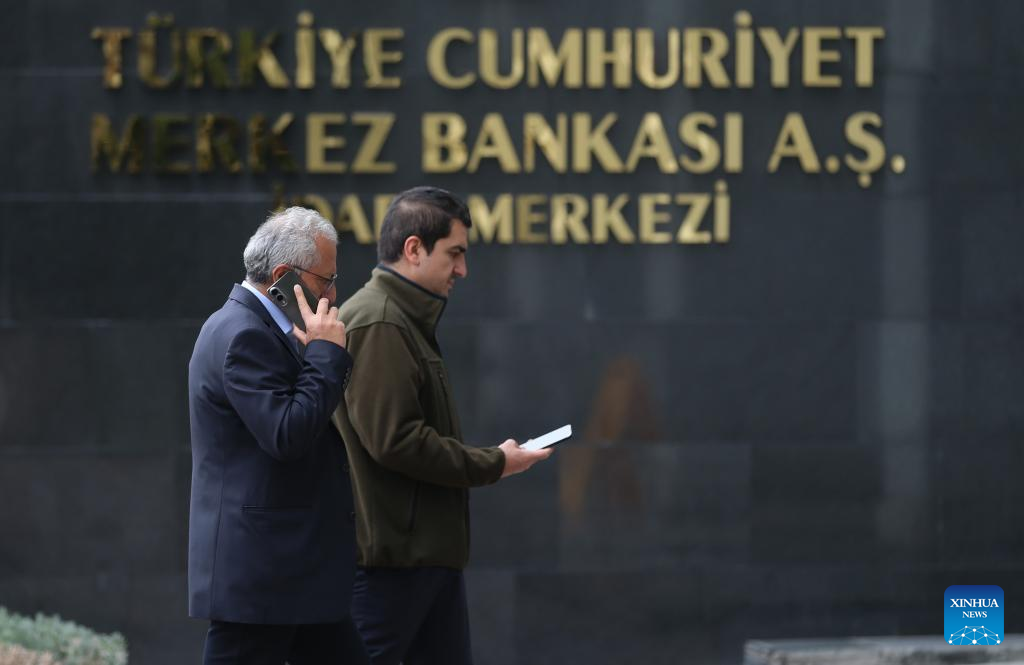
People pass by a currency exchange office in Ankara, Türkiye, on Oct. 23, 2025. (Mustafa Kaya/Handout via Xinhua)
ANKARA, Oct. 23 (Xinhua) -- Türkiye's central bank lowered its key interest rate by 100 basis points on Thursday, following a series of more hawkish moves earlier this year after a slight rise in inflation in September.
The Monetary Policy Committee (MPC) lowered the one-week repo rate to 39.5 percent from 40.5 percent, following sharper cuts of 250 and 300 basis points in September and July, respectively.
"The underlying trend of inflation increased in September," the bank said in a statement following the rate-setting meeting, noting that rising food prices were a key contributor.
Türkiye's annual inflation rose to 33.29 percent in September, up from August's 32.95 percent, marking the first monthly increase since May 2024 when it was recorded at over 75 percent.
Istanbul-based economist Atilla Yesilada, who opposed the rate cut, described the decision as a calculated but risky move.
"The central bank seems to believe that this rise is a temporary bump rather than a reversal of the disinflation trend," he told Xinhua.
"The bank is trying to keep credit flowing and support investment, but if inflation proves sticky, it may have to rethink its approach," he said.
Yesilada believes the bank may pause its easing cycle later this year to gauge the impact of the September cut on pricing behavior.
Finance professor Senol Babuscu from Baskent University in capital city of Ankara agreed that the margin for error is slim.
"Cutting rates while inflation edges up reflects a bold signal," he said. "It suggests confidence in the stability of the lira and external balances, but if price pressures accelerate again, the room to maneuver will narrow quickly," he said to Xinhua.
Analysts noted that the modest rise highlights how fragile the disinflation process remains.
"The symbolic importance of this uptick shouldn't be underestimated," Yesilada pointed out. "If inflation expectations shift upward, that could undermine confidence in the central bank's strategy," this analyst noted.
Treasury and Finance Minister Mehmet Simsek, who attended G20, IMF and World Bank meetings in Washington last week, said the inflation is expected to close the year at around 30 percent, slightly higher than the government's recently updated target of 28.5 percent for the year-end.
For months, the Turkish business community is calling for lower borrowing costs, blaming high interest rates for strangling investment, jobs, and exports.
While policymakers have managed to stabilize the economy in the past year with stronger foreign reserves, robust tourism revenues and a narrower current account deficit, consumer confidence remains weak.
Expectations for year-end consumer inflation (CPI) increased to 31.77 percent, up from 29.86 percent in the previous survey period, according to the central bank's October 2025 Market Participants Survey, released last week.
In mid-2023, the central bank reversed its low-rate stance. The shift to a tighter monetary policy has since boosted reserves and attracted foreign investment into Turkish assets.
However, after years of soaring prices, shrinking savings, and falling real wages, many Turks are struggling to keep up. A large share of household income goes to essentials like rent and food, leaving little left to spend in other parts of the economy. ■

People walk past Türkiye's central bank in Ankara, Türkiye, on Oct. 23, 2025. (Mustafa Kaya/Handout via Xinhua)
